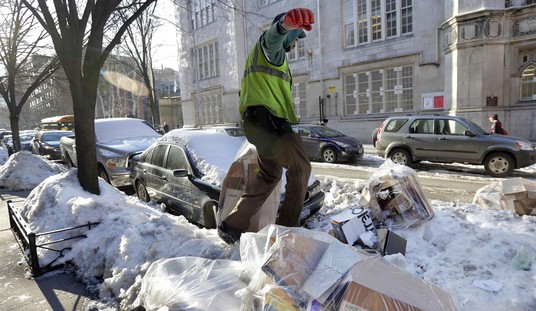As unintended consequences go, it doesn’t get much worse than this. A 19-month-old boy is in critical condition in a Georgia hospital after a flash-bang grenade tossed by a police officer exploded in his crib. Officers in Habersham County were serving a no-knock search warrant at 3 a.m. at a home where an informant had earlier purchased methamphetamine. The alleged seller, Wanis Thometheva, was not at home at the time of the raid but was arrested at another location later. The injured toddler and his parents and three sisters were visiting the home after their own home was damaged in a fire. The family has no apparent connection with drug trafficking.
The police account of the incident runs as follows: On Tuesday night, an informant made a purchase of methamphetamine from Thometheva at the home in Cornelia, about 70 miles northeast of Atlanta. Police had some prior knowledge of Thometheva: in a previous drug arrest he was found to have weapons, including an AK-47. The officers obtained a search warrant for the home, including judicial approval for a “no-knock” entry. (Officers are ordinarily required to knock and announce themselves prior to entering a location they intend to search, but the U.S. Supreme Court, in Richards v. Wisconsin and United States v. Banks, has held that a judge can waive this requirement if officers offer sufficient justification in their affidavit.)
The search warrant team went to the same doorway where the drug purchase had occurred and breached the door. The door opened partially but something was preventing it from opening further. An officer tossed in a flash-bang grenade, a device that gives off a combination of bright light and loud explosion intended to temporarily disorient occupants in the room. But when the officers finally entered, they found it was a crib that had been blocking the door, and that the grenade had landed in it, severely injuring the little boy. Medics on the warrant team attended to the boy immediately, and he was rushed to a hospital by an ambulance that had been staged nearby.
And now the obvious question: Could this have been avoided?
The simple answer is yes, it could have been, in a number of ways. First of all, Mr. Thometheva might have engaged in a livelihood other than selling methamphetamine, say, one that did not invite the attention of police officers. Or the police could have ignored the illegal activity and allowed it, and all the social ills that accompany methamphetamine abuse, to continue unmolested and poison the community.
I offer these two alternatives in jest, of course. If police allegations are true, Mr. Thometheva is a drug dealer, and as such, is unlikely to choose a different walk of life without intervention in the form of arrest and imprisonment. And Habersham County, Georgia, is not the kind of place where the citizenry encourages the police to look the other way when there’s meth dealing going on. They want it stopped. But they want it stopped without the cost of toddlers having grenades tossed in their cribs.
So, what options did the police have after making the drug purchase from Mr. Thometheva? Search warrants can be served in a number of ways, from a low-key visit from a pair of police officers to a full-scale SWAT raid. Clearly, given Mr. Thometheva’s history, the low-key option was off the table. The police felt they had ample justification for a SWAT raid, including a no-knock entry, and the issuing magistrate agreed. It has to be emphasized here that this is not a case of police corruption or cutting corners. (For a grotesque example of police corruption with tragic results, see here.) These officers were authorized to do what they did, and they were trained in the use of flash-bang grenades. And still there was an unacceptable outcome. Why?
Because in serving a search warrant, even at a location you’ve scouted adequately, even at a location you’ve searched before, you never know with precision who or what will be behind the door when you make your entry. I’ve been on hundreds of search warrants and been the author and planner of perhaps a hundred of my own warrants and tactical plans. I have never been a proponent of no-knock entries for the simple reason that I want to be absolutely sure that the people in the home I wish to search know it is the police coming through the door and not a criminal. The only exception to this I can envision is one in which an armed and dangerous fugitive is known to be in a certain residence that has been surveilled to such a degree that the number and ages of all the occupants are known at the time of entry. Beyond that, I can’t make a case for a no-knock entry, for precisely the reason that occurred in Cornelia.
But even if a SWAT team is involved, there are options other than a no-knock, dynamic entry available to officers serving a search warrant. In a “surround-and-call-out” warrant service, officers seal off all avenues of escape from a home, then order all of the occupants to exit with their hands up. Officers can then enter through an unlocked door and systematically search for anyone who may have hidden inside. In a drug investigation this is not often an option, of course, as it offers the occupants the chance to flush their inventory down the toilet. But in the case of Mr. Thometheva, he had been identified as the seller in the undercover buy, and a prosecutable case presumably could have been made on that transaction alone. Surely the police were hoping to discover additional drugs in the home when they served the warrant. (In none of the news stories I read on the incident was it revealed that more drugs were found, which suggests none were.)
Another option would have been to place the house under surveillance in the hope of seeing Mr. Thometheva leave. He then could have been detained and his house keys obtained, obviating the need for breaching tools and flash-bang grenades to make entry. And if questioned he might have alerted officers to the presence of children and other innocent parties in the home.
In offering these alternatives I, of course, have the benefit of hindsight on an incident in which a child was horribly injured. It’s easy to say the police should have done something other than that which brought about such a tragic result. But even if the initial tactics the officers chose were sound, there remains the issue of tossing the flash-bang grenade into a room without knowledge of who was inside. Flash-bang grenades can kill and have killed people, and like any weapon they should be deployed with this sobering fact in mind. One of the four basic firearms safety rules is: Never let your muzzle cover anything you are not willing to destroy. Another is: Be sure of your target. The same rules should apply to using flash-bang grenades.
What happened to that little boy is horrific, and we should pray he recovers and enjoys a full and happy life. But for the time being, at least, the drug war will continue, and with it the risk of more tragedies like this one. It’s the duty of all police officers to minimize the risks to innocents. If we fail in this, not only do we discredit our own efforts, but we break faith with the people on whose behalf we serve. We can and must to better.










Join the conversation as a VIP Member